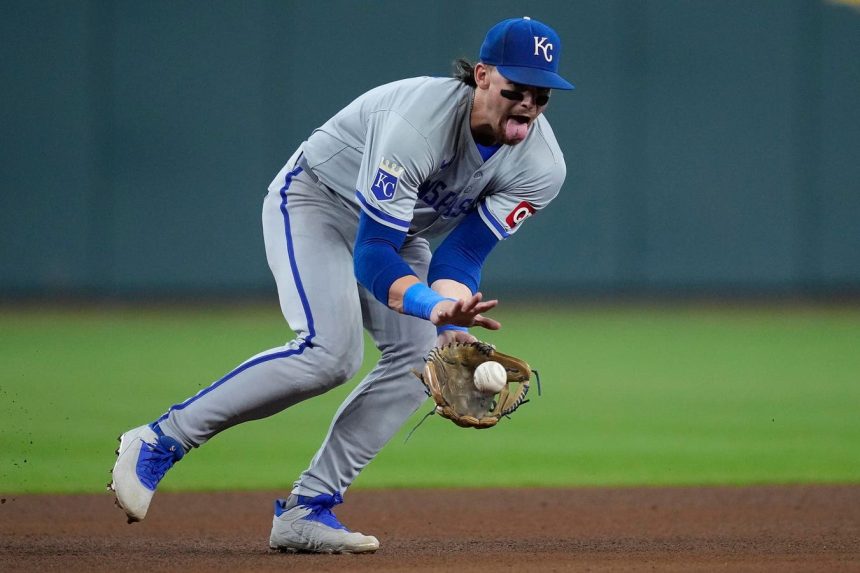The pre-arbitration bonus pool, established by the 2022 Collective Bargaining Agreement, has distributed a significant portion of its $50 million fund to a select group of high-performing young baseball stars. This pool, funded by contributions of approximately $1.67 million from each of the 30 MLB teams, aims to reward exceptional players who have not yet reached the service time required for salary arbitration. This year’s distribution saw 101 players benefit, with awards ranging from substantial sums for top performers to smaller amounts for others who demonstrated notable skills and potential. The timing of the distribution, coinciding with the holiday season, is purely coincidental, as the bonuses are strictly merit-based, recognizing on-field achievements during the recently concluded season.
Leading the pack of bonus recipients is Kansas City Royals shortstop Bobby Witt Jr., who garnered a hefty $3,077,595, solidifying his position as one of baseball’s premier young talents. Witt Jr.’s impressive performance, including a near-MVP season and a .332 batting average, has resulted in a cumulative $4.2 million from the pre-arbitration pool over the past three years. Trailing Witt Jr. is Pittsburgh Pirates pitching phenom Paul Skenes, the National League Rookie of the Year, who secured $2,152,057. Skenes’ rapid ascent from the minor leagues to an All-Star Game starting role underscores his exceptional talent and justifies his significant bonus.
Joining Witt Jr. and Skenes in the million-dollar club are several other standout players, including Orioles shortstop Gunnar Henderson ($2,007,178), Brewers catcher William Contreras ($1,722,595), and Royals pitcher Cole Ragans ($1,638,013). This group also includes Red Sox outfielder Jarren Duran ($1,321,661), Padres outfielder Jackson Merrill ($1,191,534), and Yankees pitcher Luis Gil ($1,098,628). These substantial bonuses highlight the impact these young players have made on their respective teams and the league as a whole.
Several other players received significant bonuses just shy of the million-dollar mark. Orioles outfielder Colton Cowser, who finished second in American League Rookie of the Year voting, earned $978,671. Brewers outfielder Jackson Chourio, also a Rookie of the Year finalist, received $901,335. Reds shortstop Elly De La Cruz added $860,710 to his earnings, while Athletics closer Mason Miller received $825,276. The impressive performances of these rising stars, many of whom were All-Stars, further demonstrate the depth of young talent in the league.
The Milwaukee Brewers led all teams with eight players receiving bonuses from the pool, followed by the Detroit Tigers with seven. The Arizona Diamondbacks, Cleveland Guardians, and Seattle Mariners each had six players recognized. This distribution reflects the success of these organizations in developing and promoting young talent to the major leagues. The pre-arbitration bonus pool serves as a valuable tool for rewarding these players and incentivizing continued growth.
A critical aspect of the pre-arbitration bonus pool is its independence from existing contracts. Whether a player has signed a lucrative long-term extension or is playing on a near-minimum salary, their eligibility for the bonus pool remains unaffected. This ensures that a player’s performance, not their contractual status, determines their reward. Bobby Witt Jr.’s substantial extension, for instance, did not preclude him from receiving the largest bonus. Similarly, Jackson Chourio’s record-setting contract for a player with no MLB experience did not impact his eligibility. This separation ensures that the bonus pool functions as intended – a purely merit-based system rewarding on-field excellence for pre-arbitration players. Paul Skenes’ situation provides a stark contrast, as his relatively low salary for 2025 highlights the potential for significant future earnings once he becomes eligible for arbitration. This system underlines the importance of performance in determining a player’s value and earning potential as they progress through their careers. The six-year service time requirement for free agency further emphasizes the importance of these early years in establishing a player’s financial foundation within the structured framework of the MLB system.



